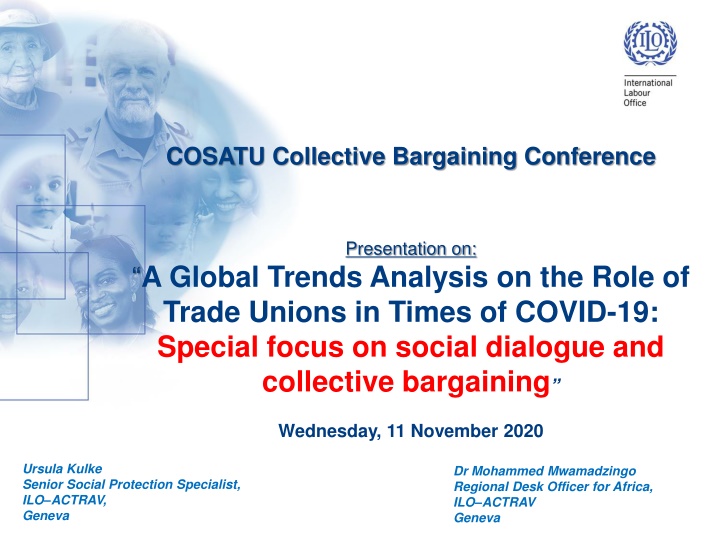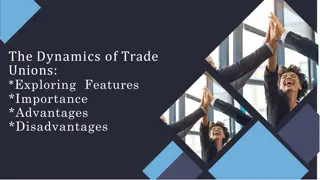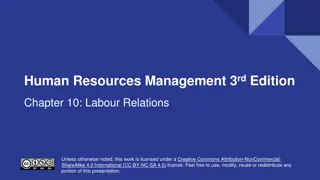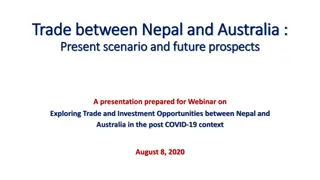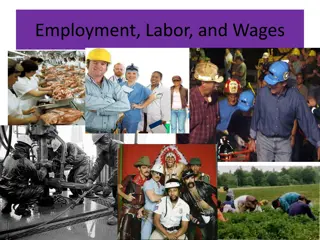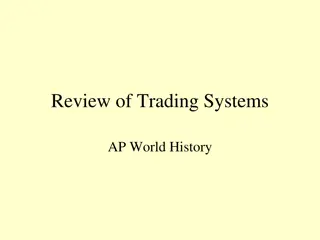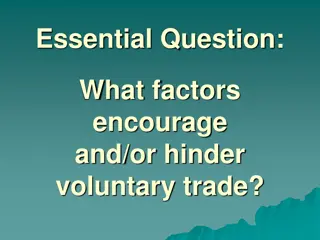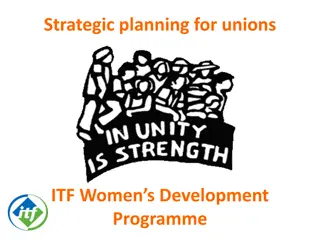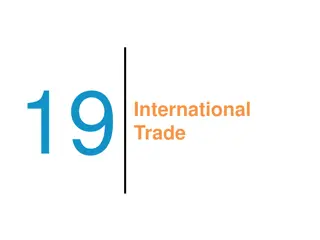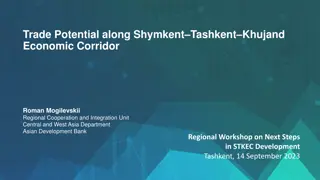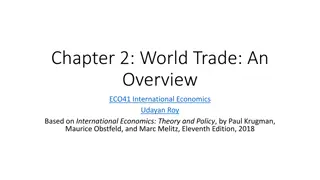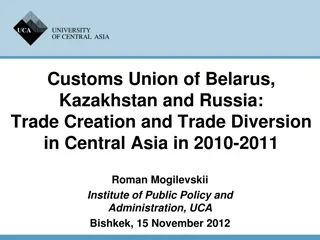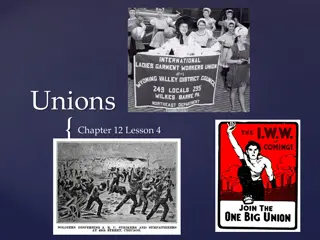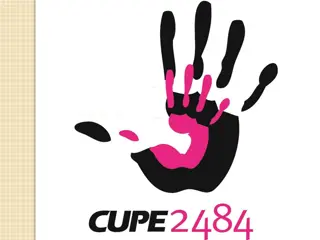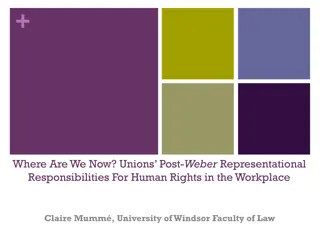Global Trends in Trade Unions During COVID-19
This presentation delves into the impact of COVID-19 on trade unions globally, focusing on social dialogue and collective bargaining. It discusses the historical significance of social dialogue in resolving crises and analyzes the responses of trade unions to the pandemic.
Download Presentation

Please find below an Image/Link to download the presentation.
The content on the website is provided AS IS for your information and personal use only. It may not be sold, licensed, or shared on other websites without obtaining consent from the author.If you encounter any issues during the download, it is possible that the publisher has removed the file from their server.
You are allowed to download the files provided on this website for personal or commercial use, subject to the condition that they are used lawfully. All files are the property of their respective owners.
The content on the website is provided AS IS for your information and personal use only. It may not be sold, licensed, or shared on other websites without obtaining consent from the author.
E N D
Presentation Transcript
COSATU Collective Bargaining Conference Presentation on: A Global Trends Analysis on the Role of Trade Unions in Times of COVID-19: Special focus on social dialogue and collective bargaining Wednesday, 11 November 2020 Ursula Kulke Senior Social Protection Specialist, ILO ACTRAV, Geneva Dr Mohammed Mwamadzingo Regional Desk Officer for Africa, ILO ACTRAV Geneva
Outline of the presentation Background to the global trends analysis Most affected workers and sectors Responses by trade unions: Focus on social dialogue and collective bargaining Approaches Achievements Challenges 2
BACKGROUND Social dialogue has helped to reconcile competing interests and to built trust in commitment to and ownership of policies For 101 years, social dialogue and tripartism has played a decisive role in addressing major global crises: the First World War, the Spanish flu pandemic, the great depression, the Second World War, the end of the Cold War and the fall of the Berlin Wall, and the 2007-09 Global Financial Crisis 3
BACKGROUND: Social Dialogue during COVID- 19 Pandemic Many countries 134 out of 188, or 71 per cent used social dialogue, whether tripartite or bipartite, either singly or together, as part of their response to the COVID-19 crisis. 13 per cent (17 countries and territories) used only bipartite social dialogue; 46 per cent (61) used only tripartite social dialogue; and 42 per cent (56) used both bipartite and tripartite social dialogue 4
BACKGROUND: Social Dialogue during COVID- 19 Pandemic Forms of social dialogue used 5
BACKGROUND: Social Dialogue during COVID- 19 Pandemic Share of countries using social dialogue 6
BACKGROUND: The Role of Trade Unions The Global Trends Analysis Our analysis is based on information provided by national trade unions to ACTRAV Specialists in ILO field offices, information available in the ILO COVID-19 Information Hub as well as information from other sources. The analysis covers the period March to August 2020 in 133 countries in all regions. 7
MOST AFFECTED WORKERS AND SECTORS Most affected categories of workers Health and frontline workers Informal economy workers Migrant workers Self-employed workers, casual workers Women and young workers Workers with disabilities Refugees 8
MOST AFFECTED WORKERS AND SECTORS Most affected sectors Tourism and hospitality Transport (road, maritime, aviation) Construction Commerce Manufacturing 9
RESPONSES BY TRADE UNIONS: FOCUS ON SOCIAL DIALOGUE AND COLLECTIVE BARGAINING Trade unions have been involved in social dialogue process in most countries. Africa Americas Arab States Asia and Pacific Europe and Central Asia World Social Dialogue 37/48 (77%) 19/25 (76%) 6/6 15/17 (88%) 34/38 (89%) 83% Tripartite and/or Bipartite Dialogue (100%) 28/48 (58%) 15/25 (60%) 2/6 (33%) 10/17 (59%) 24/38 (63%) 59% Tripartite Dialogue 25/48 (52%) 13/25 (52%) 6/6 12/17 (70%) 22/38 (58%) 58% (100%) Bipartite Dialogue 10
RESPONSES BY TRADE UNIONS: FOCUS ON SOCIAL DIALOGUE AND COLLECTIVE BARGAINING Trade unions have been involved in social dialogue process in most countries Tripartite dialogue 63% 60% 59% 58% 33% Europe and Central Asia Americas Asia and Pacific Africa Arab States 11
RESPONSES BY TRADE UNIONS: FOCUS ON SOCIAL DIALOGUE AND COLLECTIVE BARGAINING Trade unions have been involved in social dialogue process in most countries Tripartite dialogue Most frequent subjects of negotiation have been social protection employment commitments towards collaborative industrial relations fiscal policy Occupational health and safety measures 12
RESPONSES BY TRADE UNIONS: FOCUS ON SOCIAL DIALOGUE AND COLLECTIVE BARGAINING Trade unions have been involved in social dialogue process in most countries Bipartite dialogue 100% 70% 58% 52% 52% Arab States Asia and Pacific Europe and Central Asia Africa Americas 13
RESPONSES BY TRADE UNIONS: FOCUS ON SOCIAL DIALOGUE AND COLLECTIVE BARGAINING Trade unions have been involved in social dialogue process in most countries Bipartite dialogue Joint concerns involving workers and employers Policy approaches Stimulus measures Satefy and health protocols Memorandum of understanding Specific collective bargaining agreements Social pacts for advanced industrial relations 14
Examples of measures taken in response to Covid-19 Germany: IG Metall and Gesamtmetall singed a collective agreement including arrangements for short-time working securing 80% of net remuneration; 8-day paid leave for parents with children up to the age of 12; 5-day paid childcare leave which will not be deducted from their annual leave. Italy: Government and social partners signed an agreement on March 14, 2020 to relax telework regulations and ensure the health and safety of workers who cannot work from home. Kazakhstan: Trade unions federations of Kazakhstan negotiated with the Minister of Employment and Social Protection a Special Package for employees affected by COVID19 including a compensation equal to the minimum wage for workers in quarantine; a bonus for medical personnel; delays in bank loans and utilities; in-kind benefit for large families Sweden: On 18 March, Unionen, the Swedish white-collar trade union and Swedish Confederation of Enterprise agreed on a nation-wide collective agreement on short-term work. Malawi:The Malawi Congress of TU (MCTU) has urged employers employing more than 1000 employees to split their workers into shifts to reduce congestion amid the threat of COVID-19. Paraguay: The Trade Unions CUT, CUT-A, CNT, CGT, CESITP have jointly proposed to the government the reduction of fuel and prices of public transport, control of medicines and food, reduction of the VAT on basic basket, suspension of the IRP tax for young workers income, protection of employment and avoiding the payment of wages below the minimum wage, etc. Trade unions actions and Social dialogue 15
CHALLENGES 1. Lack of respect of trade unions rights Violations of trade unions/workers rights during the COVID-19 crisis have been reported by several trade unions 67% 35% 29% 25% 20% Arab States Asia and Pacific Europe and Central Asia Africa Americas 16
CHALLENGES 2. Delayed response by trade unions Just like many institutions, trade unions were caught unaware by the pandemic. On the onset of the lockdown measures, many trade union leaders and activists could not find their feet on how to reach out to their members and other partners. 17
CHALLENGES 2. Institutional rigidities Existing trade union infrastructure (including ICT) was not adequate to meet the challenges of the lockdown measures, services to the vulnerable workers. virtual meetings and 18
COSATU Collective Bargaining Conference Presentation on: A Global Trends Analysis on the Role of Trade Unions in Times of COVID-19: Special focus on social dialogue and collective bargaining Wednesday, 11 November 2020 Ursula Kulke Senior Social Protection Specialist, ILO ACTRAV, Geneva Dr Mohammed Mwamadzingo Regional Desk Officer for Africa, ILO ACTRAV, Geneva
